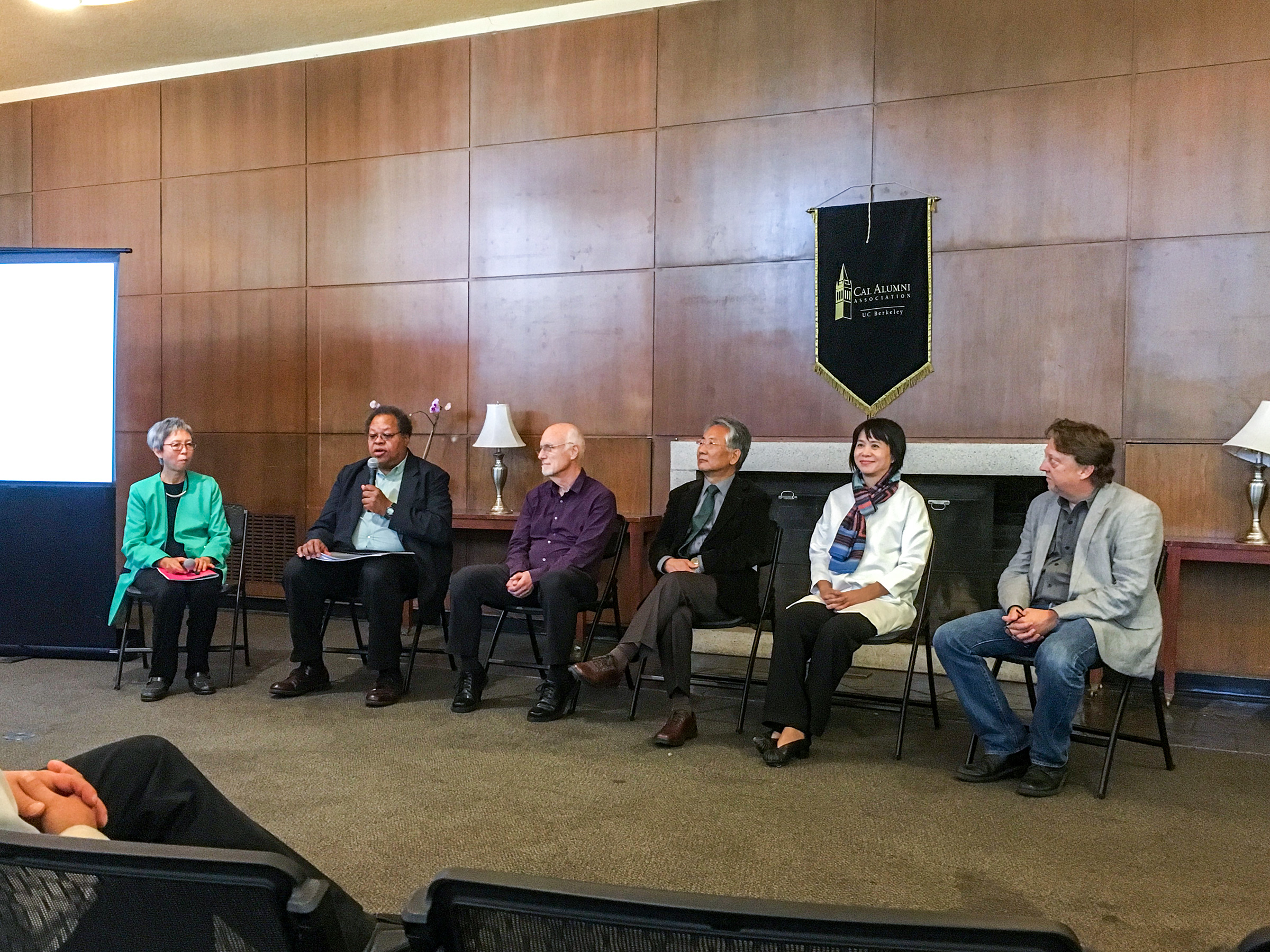ARTICLES
By Ken
...BUT WE CAN USE
NEW MUSIC TO FIX
THAT PROBLEM
NEW MUSIC TO FIX
THAT PROBLEM
AMS Evening Paper
2017
by Ken Ueno
My experience living in Europe is that I was hardly ever accepted as an American. In America, we live by the caveat that identity can be formed through participation, that through hard work, we can become “American.” My Plan A, before I became a musician, was founded on that premise: go to West Point, become a general, come back to California, and become a senator. However naïve that dream was, and however problematic I now know it to have been, I am still thankful for it. Had I not been American, I don’t think I would be speaking to you today. It allowed a twenty-five-year-old former cadet to begin composing and start a career in music, whereas in Europe, he might not even have gained entry into the conservatoire. One of the things I learned in Europe is that classical music operates as a different cultural signifier, there than here. There, it is a primary referent. Here, it is a borrowed cultural artifact. We take that for granted. Our assumption that culture is something that can be gained through good-ole American participation does not fully transpose to classical music composition. I have heard many American colleagues talk about the “tradition” as some reverential grandfather who would love us back, if only we kowtowed enough and helped shave the callouses off his hardened feet. The truth is, Beethoven can’t give two fucks about us. Don’t get me wrong. There is much that I admire about Beethoven’s music. I don’t have an issue with the man or the music. The issue I have is that he represents a glass ceiling, a visible reminder of the fact that I don’t belong to the dominant culture of classical composition. It would have saved me much grief, if I had a mentor during my formative compositional years who had gone through similar issues of feeling neo-colonized. My teachers were mainly white males who still believe that they belong to the “tradition.” This is why diversity is important: if you are part of the dominant culture, you are blind to the anxieties of the those who are not.
What we can do, here, is democratize the idea of a “composer” by rebranding it, for wider participation and inclusion. George Lewis reminds us in Improvised Music after 1950, that for Dahlhaus, “The dialectic between composition and notation is critical to the notion of composition itself.” That Dahlhausian notion of a composer as someone who, in part, notates music, still informs our present ontological discussions about “composer.” But, here, the legal standard is that it can suffice that music is fixed as a recording to be claimed as intellectual property. The fundamental tension at issue today is that the cultural values of 18th and 19th century Europe do not resonate with mainstream 21st century America.
21st century America has the advantage of non-notaters who are great cultural influencers, like the Beyoncés of the world. Her musical accomplishment is rich and nuanced and genius. Listen, for example, to the moment in Pray You Catch Me from her album, Lemonade, right after she sings the words of the title. There is a space long enough that we can hear wetter layers of reverb at lower dynamic levels linger. The lingering “catches” the words “catch me,” thereby collapsing object and subject into one, through a technologically mediated orchestrational move. It also obscures the words enough to create a sonic space that feels introverted like a prayer that also projects outwards as a leap of faith. In a few seconds, she text sets a wisdom wrought through the travails of love and life. On the last track of the album, Formation, when she sings, “I just might be a black Bill Gates in the making,” we believe her. She is the CEO of her musical vision. It is notable that she chose “Bill Gates” as a metaphor for success rather than Rockerfeller, as Roc-A-Fella, a neologism in which Brooklyn-ese mutates “feller” into a gendered “fella,” is the moniker of her husband’s record label. Two tracks earlier, on Freedom, when Kendrick Lamar, raps “open correctional gates in higher desert,” “gates” takes on both biblical and criminal justice valences. When we get to Formation, those manifold significations are still in play, when we hear “Bill Gates.” In this way, macro-structural connections across multiple songs are made palpable in Lemonade. Beyoncé is an icon of empowerment not only for women and African-Americans, but for all who ever felt disenfranchised by the dominant other. This is why diversity is compelling: Beyoncé’s rhetoric for change is embodied in her art.
This more open standard for “composer” is what I experienced three weeks ago, when I served on the panel of the American Composer Forum’s Jerome Foundation Grant. We vetted 155 applications representing a wide range of genres: post-rock, folk Americana, jazz, electronica, pop, and contemporary classical. The validation that artists can receive from such grants can be identity forming.
Aby Wolf, one of my colleagues on one of panels told me:
Another fellow panelist, the drummer/improviser, Davu Seru, said, “Memory, like history is a score in need of violation.”
Aby Wolf, one of my colleagues on one of panels told me:
“To me, the term ‘composer’ has always belonged to the avant-garde and classical world. When writing art-pop and loop songs, I’d never considered myself a composer- until I was awarded a MECA grant from the American Composers Forum.”
Another fellow panelist, the drummer/improviser, Davu Seru, said, “Memory, like history is a score in need of violation.”
Our moment is a call to action to violate history. We need to engage in meta-composition, a larger engagement towards cultural, democratic, advocacy. The diversity issue in contemporary classical music cannot be solved merely by commissioning more women and people of color. It needs to be a more holistic shift in academic culture as well. Diversity is not solved statistically. In the zero-sum game of academic hires, real diversity is not served by merely hiring a person of color, if that person’s task is mainly to serve the Western canon. There needs to be curricular space to balance the Western canon. There are latent values, too, that get promulgated when a cadre of all-white professors hire master musicians who are people of color to teach the music practice of their authentic cultures, when, nowadays, there are master musicians of non-Western music cultures who have PhDs. They should be professors. The performance practice of academia is exnomination. “Exnomination (again, George Lewis in Improvised Music after 1950, but here quoting John Fiske) is the means by which whiteness avoids being named and thus keeps itself out of the field of interrogation and therefore off the agenda for change.” Latent values are also messaged in the architecture of our institutions. For six years, I saw Beethoven’s name glaring down at me from a privileged space above the middle of the stage in Paine Hall at Harvard. It said to me that history was closed, that the best music had already been achieved. What hope is there for any of us to continue making new music, then?
At this point, I want to share with you a hopeful picture.
![]()

This is a photo of the commissioned composers of the Pacific Rim Music Festival’s Gugak Orchestra project from two weeks ago (George Lewis, David Evan Jones, LEE Geonyong, Shih Hui Chen, Edmund Campion, and missing from this august cohort is Chinary Ung). This, is meta-composition, curated by Hi Kyung Kim (the woman to the far left), the festival director. I am further inspired by the fact that these great composers were commissioned to compose not for a Western orchestra, but for an orchestra of traditional Korean instruments. But, meta-composition requires hard, tireless work. Start with a vision, reach out to composers, partner with multiple institutions, write grants, schedule rehearsals, build a team, book venues, pick the performers up from the SFO, feed and house them…find a sleigh bell right before the dress rehearsal (this is true). And, as anyone with festival production experience knows, you have constantly put out fires. The Hi Kyung Kims of the world are our real heroes. It takes real passion to work this hard to affect real change. This is why we need diversity: people comfortably in the dominant culture rarely have the passion to work this hard to affect real change.
I would like to conclude by quoting Calvino: “The inferno of the living is not something that will be; if there is one, it is what is already here, the inferno where we live every day, that we form by being together. There are two ways to escape suffering it. The first is easy for many: accept the inferno and become such a part of it that you can no longer see it. The second is risky and demands constant vigilance and apprehension: seek and learn to recognize who and what, in the midst of inferno, are not inferno, then make them endure, give them space.”
If new music will be able to fix it, it will have to begin to look like this:
![]()
